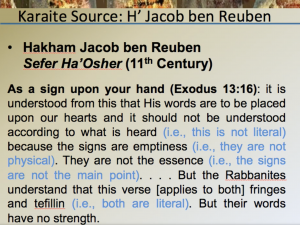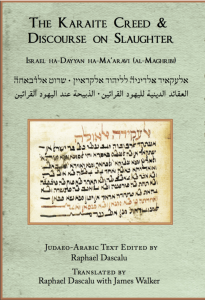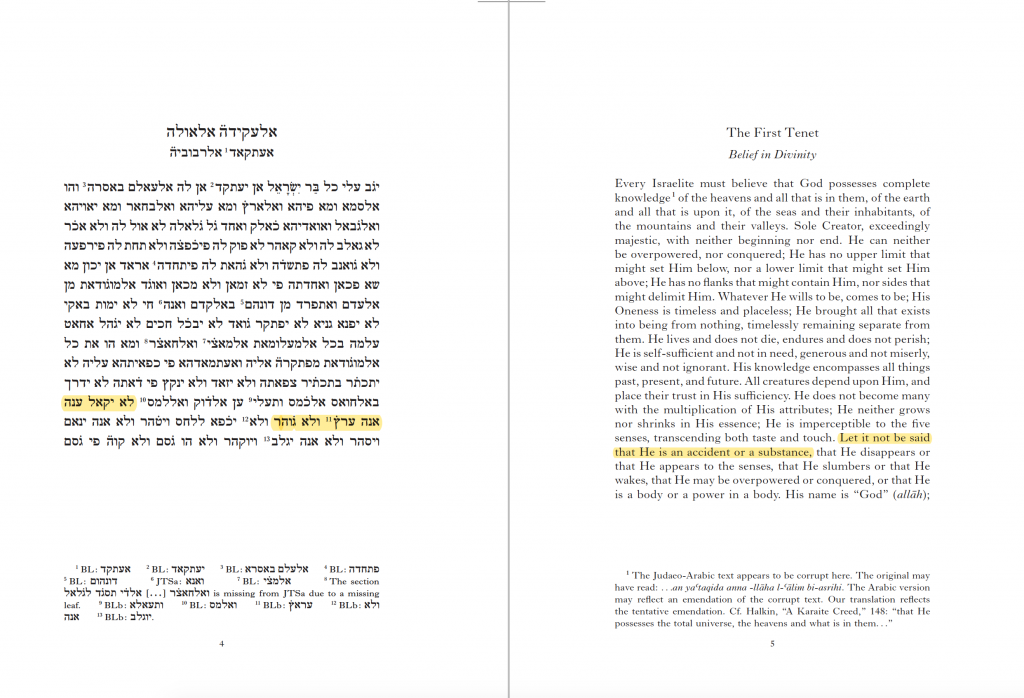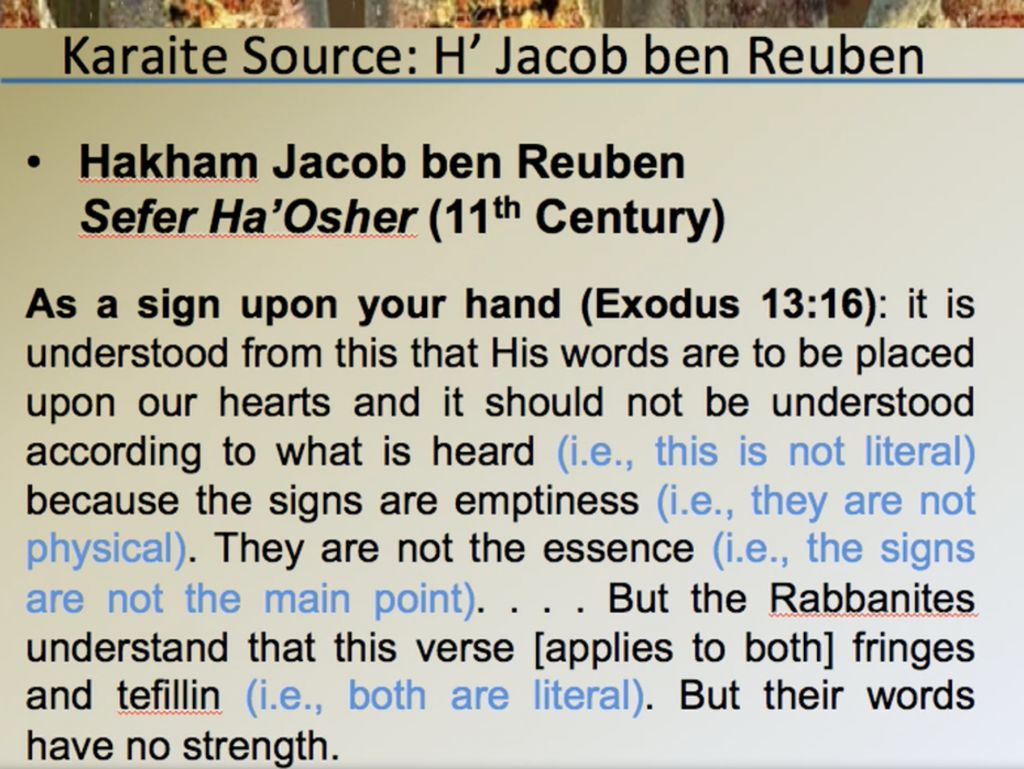Or: “How I whiffed in that extremely popular Tefillin video.”
Today, on the week when we read some of the “tefillin passages” in Parashat Bo, I do a massive mea culpa on a relatively minor part of the Tefillin video I posted almost two years ago. And in the process of this correction, I will (hope to) elucidate yet again, why we need more Karaite literature available in English. And why we all need to study more philosophy. Or at least I do.
Before we get to the tefillin mistake, I want to show you what helped me understand the mistake. Over the last year, I was working on the publication of The Karaite Creed & Discourse on Slaughter.
The section of the book, which we titled The Karaite Creed, contains six principles of faith for Karaite Jews, according to Hakham Israel Maghribi. In the very first principle, H’ Israel sets forth in Judeo-Arabic the contours of what it means to believe in God. And in relevant part, he writes, “Let it not be said that He [God] is an accident or a substance.”
I had read these words perhaps 100 times, and had no clue what they meant. My eyes just glossed over them as if the words were in a foreign language – until one day they just jumped out and hit me in the face.
For those who do not know, “accident” and “substance” are Greek philosophical terms.
Accident refers to the non-essential elements of an object. So, for example, if we are discussing cars – some may be red, others may be gray; some may be manual, others may be automatic; some may have leather interiors, others may have cloth; some may have immovable roofs, others may be convertibles. Because color, transmission-type, interior décor and the roof may vary from car to car, these items are considered “accident” – that is, a car may have any of these properties, but it is still a car.
Substance, on the other hand, refers the characteristics of a car that make it a car. I actually can’t identify what those characteristics are – but we all know one when we see one.

So, when Hakham Israel Maghribi is saying that God is not accident or substance, he is essentially saying that God cannot be limited or characterized by these terms. Or something like that. I’m not learned enough to know what he really intends to convey when he says God is neither accident nor substance.
In any event, back to that tefillin video. Here is the relevant slide.
Now here is the relevant part of the actual Hebrew comment that we were translating:
לאות על ידכה – חפץ ממנו שנשים דבריו בלבבנו ולא יפתר על משמעו כי האותות אפעים אינם עיקרים
The word we translated as emptiness is epha’im (אפעים). This is a fairly literal translation of a word that appears only once (albeit in the singular, אפע) in the entire Tanakh.
We did not know it at the time, but the word אפע has a very specific meaning in pre-12th century Karaite Hebrew. It means – accident. Yes, the same philosophical accident we were speaking about earlier. And yes, there is such thing as Karaite Hebrew. And in many cases, this Karaite Hebrew is based on unique meaning ascribed to words that appear once in the Tanakh.
The word we translated as “essence” is ‘iqarim (עיקרים). This word usually means “principle” or “main point.” But here it is being used in the sense of the philosophical term “substance”. In fact, essence is not a half-bad translation for substance (which is often referred to as “essential substance”) – but we totally tripped into this decent translation.
We had no clue what we were reading.
So there you have it; the proper way to understand the relevant part of H’ Jacob ben Reuben’s comment (with the corresponding biblical verse) is as follows:
Biblical Verse:
Exodus 13:16: And it shall be for a sign upon your hand, and for totafoth between your eyes; for by strength of hand, YHWH brought us forth out of Egypt.
Hebrew Comment:
לאות על ידכה – חפץ ממנו שנשים דבריו בלבבנו ולא יפתר על משמעו כי האותות אפעים אינם עיקרים
Translated Comment:
for a sign upon your hand: It is understood from this that his words are to be placed upon our hearts, and it is not to be interpreted according to what is heard (i.e., it is not literal), for the signs are accident. They are not substance.
* * *
There you have it. To fulfill the part of the commandment that refers to the signs, you are focussing on “accident” – that is, the non-essential part of the commandment. So, whether you wear tefillin or not, whether you have studied philosophy or not, I hope that however you interpret the commandments, your interpretation is filled with substance.
Despite this mea culpa, I also hope you enjoy the tefillin video. And I should get back to doing more learning.






Immediately under “Translated Comment” you have this sentence:
“for a sign upon your had” (missing ‘n’ in hand).
Feel free to delete this comment as I’m only trying to help you fix a typo 🙂
thanks. Fixed.
I’m thrilled with your explanation. I’ve never heard of accident and substance.
Thank you with all our hearts!
I definitely need to study more philosophy! XD
Thank you, Shawn!
Why do you feel the necessity of not answering my reply concerning Ezekiel 13:18-21.
“And you, O mortal, set your face against the women of your people, who prophesy out of their own imagination. Prophesy against them
18and say: Thus said the Lord GOD: Woe to those who sew pads on all arm-joints and make bonnets for the head of every person, in order to entrap! Can you hunt down lives among My people, while you preserve your own lives?
19You have profaned My name among My people in return for handfuls of barley and morsels of bread; you have announced the death of persons who will not die and the survival of persons who will not live—lying to My people, who listen to your lies.
20Assuredly, thus said the Lord GOD: I am going to deal with your pads, by which you hunt down lives like birds, and I will tear them from your arms and free the persons whose lives you hunt down like birds.
21I will tear off your bonnets and rescue My people from your hands, and they shall no longer be prey in your hands; then you shall know that I am the LORD.”
sorry, what is the question?
Why does Hashem thru His prophet Ezekiel warn of the wearing of bonnets (kippot) and sewing pads (tefillin) on arms as men who attempt to take His people away from Hashem?
The meaning of tefillin: The written Torah has four pesuks for tefillin. The phrase which allegedly commands the donning of Tefillin appears four times in the Torah (Exodus 13:9; Exodus 13-6; Devarim 6:8-9; Devarim 11:18). It should be noted that the difficult word “Totafot” which the Rabbis arbitrarily interpret to mean “Tefillin”, actually means “Remembrance”. This is clear from Exodus 13:9 (one of the four “Tefillin” passages) which substitutes the word “Totafot” with the equivalent but more familiar “Zicharon” (Remembrance). Upon closer examination it becomes clear that this phrase is a figure of speech and not a command at all.
Commenting on the verse “And it shall be for a sign upon your hand and a remembrance (Zicharon) between your eyes” he writes: “‘For a sign upon your hand’ According to its plain meaning (omek peshuto), ‘It shall be remembered always as if it had been written upon your hand’ SIMILAR TO ‘he put me as a seal upon your heart’ (Cant 8:6). ‘Between your eyes’, like a piece of jewelry or gold chain which people put on the forehead for decoration” (Rashbam on Exodus 3:9) Rashi’s grandson rightfully interprets the “Tefillin passage” as a metaphor which demands that we remember the Torah always and treasure it like a piece of fine jewelry. Rashbam and the Jews who today follow Hashem’s written Torah laws realize that not everything in the Torah is to be taken literally as a command. The classic example of this is “And you shall circumcise the foreskin of your heart” (Devarim 10:16). Obviously, G-d is not commanding mass suicide but is rather commanding us to figuratively circumcise the foreskin of our hearts, i.e. remove our impurity and stubbornness and commit to his covenant with our hearts. While this metaphor was easy to understand it is less obvious what kind of metaphor lays behind “and it shall be for a sign upon your hand and a Remembrance between your eyes “. This question is clarified by several passages elsewhere in the Tanakh.
§ “Listen my son to the teaching of your father and do not abandon the Torah of your mother; because it is a beautiful wreath for your head and a necklace upon your throat” (Proverbs 1:8-9)
§ “Do net let truth and righteousness leave you; tie them upon your throat, write them upon the tablet of your heart.” (Proverbs 3:3)
§ ” And this shall serve you as a sign on your hand and as a reminder on your forehead—in order that the Teaching of the LORD may be in your mouth—that with a mighty hand the LORD freed you from Egypt.” (Exodus 13:9)
§ “Keep my son the Mitzvot of your father and do not abandon the Torah of your mother; Tie them upon you heart always, don them upon your throat” (Proverbs 6:20-21)
§ “Bind them on your fingers; Write them on the tablet of your mind.” (Proverbs 7:3)
In light of these verses the meaning of the “Tefillin” passage becomes clear: “And let these things which I command you today be upon your heart… and you shall tie them for a sign upon your hand and for a remembrance (Totafot) between your eyes and write them upon the doorposts of your houses and your gates” (Deuteronomy 6:8-9)
It is clear that Hashem does not want His people to follow the Sages and Rabbanim’s man made laws to wear kippot or wear actual tefillin on the arms.
What is your perspective?
I’m not sure that Totafot is referring to kipot. Donning tefillin requires 2 phylacteries one for the head and one for the arm (shel rosh, shel yad). I’m also not sure that Ezekeil’s reference to “bonnets” necessarily means kipot either. My interpretation is that the practice of wearing two phylacteries is what is being addressed here. It seems to be a condemnation of wearing tefillin alone rather than wearing tefillin and kipot. I have yet to see a commandment either for or against wearing a kippa. It is a custom and so long as it doesn’t contradict the written word of the TANAK it should be lawful. Are you aware of any other references other than the ones you mentioned that prohibits the wearing of kipot?